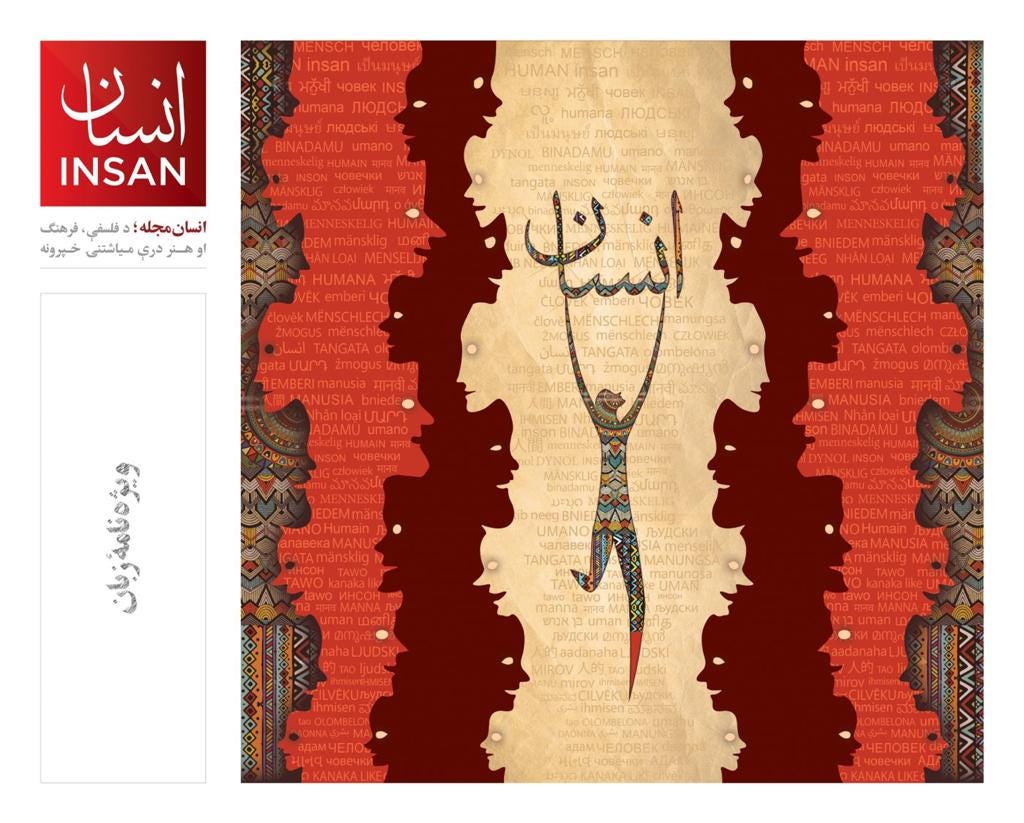Insan Magazine: A Voice For All Afghans
An enduring MENA publication shares bold ideas that challenge extremism with rational thought and scientific debate
When Musa Aziz joined Insan Magazine in 2013, media freedom was at its height in Afghanistan. Prominent platforms like Tolo TV, Ariana Television Network and One TV Media reached millions of Afghans daily while smaller networks and publications flourished in a vibrant media landscape.
The country’s constitution, published in 2004, guaranteed media freedom, giving every Afghan the “right to express thoughts through speech, writing, illustrations… and print and publish on subjects without prior submission to state authorities.” After being silenced during five years of Taliban rule, journalists, both male and female, were able to ask tough questions and hold their government to account.
“There was huge excitement. Writers could report and write on anything without censorship. A lot of people wanted to be journalists and there were opportunities for them to do it,” Aziz recalls.
By 2013, the year Insan Magazine launched, it was normal to see female anchors report the news alongside male colleagues and watch politicians probed on national TV. Topics that were once off-limits were now widely discussed as newspapers and magazines fuelled the appetite for ideas pulsing through Afghan society.
Insan would be an outlet for intellectual expression – a place where rational thought, free speech and progressive ideas flourished under the tagline ‘Humanity Above All’, underscoring the magazine’s emphasis on the shared human experience over division. “It was inspired by a profound desire to promote a society grounded in scientific reasoning, humanistic values, tolerance, justice and love,” Aziz says.
After decades of war and five years of media blackout, this would be a counter-narrative to the extremist ideologies that had held the country captive. “We saw an opportunity to break this dichotomy of thought,” he adds.
Today, as Afghans endure another period of oppression under the second Taliban regime, Insan’s pluralist mission is more important than ever. “Insan’s work in fostering intellectual freedom and encouraging philosophical discussions stands as a bulwark against intellectual and cultural repression,” Aziz explains.
That is why Ideas Beyond Borders has awarded Insan an Innovation Hub grant as they prepare a new issue centered around the theme of language. “In this climate, the work of Insan Magazine is a vital source of truth for Afghans living under a violent, totalitarian regime. The Taliban wants to destroy the space for ideas in the country and we need publications like Insan to rival their worldview,” says Faisal Al Mutar, President of Ideas Beyond Borders.
Independent Ideas
Many of Insan’s early readers were intellectuals – thinkers and academics interested in the socio-cultural changes sweeping across Afghanistan. But its appeal soon spread to a wider audience, with articles in Pashto and Dari reaching different groups with thought-provoking content that bridged the gap between academic disciplines with the wider realms of art, literature and science.
Unusually for Afghan magazines at the time, Insan published online, aspiring towards a global readership as the country strengthened its ties with the outside world. “While Insan Magazine is deeply rooted in its Afghan context, its vision and discussions resonate far beyond, offering an international audience insights into the challenges, aspirations and developments of a country at the crossroads of change,” Aziz adds.
There were still challenges. Many of the independent outlets were owned by politicians and warlords with their own agendas. “The media was relatively free to publish what they liked but it was also used as a political tool to spread hatred and division,” Aziz says. Insan’s founders offered an alternative to these polarised narratives. “We had an extremely diverse group of people writing for us, which no other outlet had because they all took sides,” he adds.
The End of Free Media
It would be a little while before the spirit of optimism that infused this period of progress gave way. Even as attacks against journalists increased with the resurgence of Taliban influence across parts of Afghanistan, reporters continued their work. Then, in April 2021, the US government announced its imminent withdrawal from Afghanistan and the Taliban swept across the country, claiming the capital Kabul on August 15.
A swift crackdown on independent media followed with a spate of brutal attacks as pictures emerged of journalists being beaten and detained in Taliban custody. The message was clear - the era of media freedom in Afghanistan is over.
Hundreds of reporters fled the country as the group moved to cement its power and restrict other freedoms, unpicking two decades of progress in human rights across Afghanistan. By the end of 2021, a total of 231 media outlets had closed and 6,400 journalists had lost their jobs, including 84 percent of female journalists as the group rapidly dismantled women’s rights.
Two years later, the kidnappings and harassment of journalists continue, as the Taliban enforces strict censorship of all media output shaping the narrative around their rule. “The destruction of so much of Afghanistan’s free media is among the most striking and shocking consequences of the regime change in that country. “What journalists remain face aggravation, attack and arrest,” Tim Dawson, deputy general secretary of the International Federation of Journalists said in a recent report.
Only a handful of reporters continue to report the truth undercover, risking their lives to ensure the world knows what’s happening in Afghanistan. Ideas Beyond Borders supports several organizations working with reporters on the ground, as well as those living in exile, looking for ways to serve their country from afar.
“Looking at the future Afghanistan faces, it’s more important than ever to find ways of amplifying the few voices still finding a platform for the truth. Without them, we would lose our window into the country,” Al Mutar says.
With the media landscape inside Afghanistan so restricted, publications like Insan Magazine operate externally to provide an alternative narrative to the Taliban's official line. “The landscape has changed and we are in exile but we are still focused on diversifying the discourse in Afghanistan,” Aziz says. “While the Taliban's takeover has drastically changed the media environment in Afghanistan, the determination of journalists, both within the country and in exile, to continue telling the story of Afghanistan remains unbroken,” he adds.
This article was written by Olivia Cuthbert.





